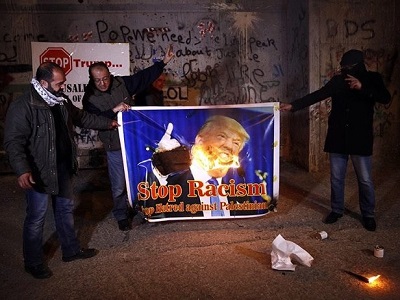
Latin American and Caribbean countries voiced strong opposition Thursday to a decision by the US to recognize Jerusalem as Israel’s capital and its plans to move its embassy there.
Eight out of 15 nations in the UN Security Council, including Bolivia and Uruguay, called for an urgent meeting of the council to discuss the issue.
Bolivian ambassador to the UN Sacha Llorenti said this, “unilateral decision violates various Security Council and General Assembly resolutions, undermines any attempts to reach a peaceful resolution to the Israeli-Palestinian conflict and makes the already volatile region even more unstable”.
Llorenti said on Twitter that the meeting will take place Friday morning.
The government of Uruguay stressed that the White House’s decision, “does not help to improve the climate of peace and mutual respect needed to reach a complete, lasting and fair solution in the Middle East”.
Bolivia's Ambassador to the U.N said that they would call for an urgent meeting on President Donald Trump's decision to move the U.S embassy from Tel Aviv to Jerusalem. He described this move as ‘reckless and dangerous'. #sabcnews #JerusalemEmbassy #Trump
— SABC Prime Time (@SABCNews_) December 6, 2017
Venezuela rejected and condemned the US government’s decision, which the South American country called “arbitrary”.
“The Bolivarian government of Venezuela rejects all arbitrary and un-consulted actions that seek to expand the illegal presence of Israel in occupied Palestinian territory and its de-facto annexation of the city of Jerusalem,” Venezuela’s Ministry of Foreign Affairs said in a press release.
Venezuela, as president of the Non-Aligned Movement and as a “brother to the just causes of the Arab World”, considers the move a “flagrant violation” of international law.
Venezuela condemns the decision of the United States about Jerusalem pic.twitter.com/IW7T1EF9aS
— Emb Venezuela Kenya (@EmbassyVenezK) December 7, 2017
Ecuador’s Ministry of Foreign Affairs warned against “the negative effects” the US decision could have on peace talks between Israel and Palestine.
Cuba was also among the countries that criticized Washington´s announcement, saying it “violates the legitimate interests of the Palestinian people” and highlighted that the decision will have “grave consequences” on the Middle East´s security and stability.
According to Cuba’s Ministry of Foreign Affairs, modifying the “historic status” of Jerusalem will “heighten tensions in the Middle East even more”.
#Cuba rejects #Trump 's unilateral declaration of Jerusalem as #Israel 's capital pic.twitter.com/9BsDiCuO0P
— Héctor Igarza Cabrera (@DirDANMO) December 6, 2017
Taking a softer stance, the Argentinian government said it regretted the “unilateral measures that could modify” the special status of Israel by recognizing the 1967 borders and recalled UN General Assembly Resolution 181 of 1947 as well as the “free access and unrestricted transit to holy sites for pilgrims of the Abrahamic faiths”.
Mexico, through its Foreign Affairs Secretary, said it will maintain its embassy in Tel Aviv.
“Mexico will maintain its friendly bilateral relations with the state of Israel…and it will also support the historic claims of the Palestinian people,” said Mexico’s Minister of Foreign Affairs.
Chile rejects Trump’s recognition of Jerusalem as Israel’s capitalhttps://t.co/xeOzOIdHKK #Chile #Trump #Jerusalem #Israel #Palestine #Latam pic.twitter.com/61pdKqN4Hx
— SantiagoTimes (@SantiagoTimes) December 7, 2017
The Chilean government said it was worried over the “illegal occupation of Israel over eastern Jerusalem” and made an “urgent appeal to all parties involved to reconsider or withhold adopting decisions that could lead to hate and violence”.
The current presidential candidate and former president of Chile, Sebastian Piñera criticized “Trump’s decision of recognizing Jerusalem as the capital of Israel since it hinders the two-state political solution fostered by the UN and supported by the immense majority of countries”.
Former Colombian president and head of the Union of South American Nations (UNASUR) Ernesto Samper warned over the consequences of Trump’s decision.
On his Twitter account, Samper said: “Jerusalem is the only geographical zone of reconciliation left between the Palestinians and Jews. The fact that @POTUS is handing it over to the Jews means that it will become the battlefield of a new religious war in the world”.
(MEMO, PC, Social Media)




